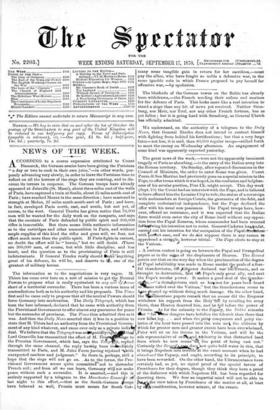- A curious contest is going on between the Papal
and Evangelical papers as to the signs of the displeasure of Heaven. The Record points out that on the very day when the proclamation of the dogma of Papal infallibility was made in Rome amidst tke.peals of a fear- ful thunderstorm, tht iElhperor declared war 'a/Prussia, and so brought to destruction, 'first tilt Pope's only great ally, and next the Pope's secular power. It makes a good deal of the thunder- -" a thmnieirstorm such as haspnot for years bee fi heard e rolled over the Vatican," but the thunderstorm seems to have eared up without doingmuch damage. On the other hand, theNarldnontane papers remark that no sooner did the Emperor withdraw his support from the Holy'Stt- by recalling his army there, than Heaven deserted him, and ke fell before the power of Prussia. As for the calamity to the Papa7y, the Tablet remarks 'Sat " firlilfese dangers have befallen the Church than those that now &lathy. . . and when the pitttir conquerors and petty vic- tories of the hour have passed info'the ruin andg the oblivion by which far greater men and greater events have been overwhelmed, eter will sit on his throne in the Vatican, and will be the
nd authority in that distracted land
the point of being cast out." of quite hold water in this, that t the exact moment when he had abandoned the Papacy, and ought, according to its principle, to have been rewarded. On the other hand, the Ultramontanes have certainly had, as yet, no signal proof of the special favour of Providence for their dogma, though they think they have a proof of the disfavour with which Napoleon III. has been regarded for deserting them. We fear an impartial mind will not be able to e view taken by Providence of the matter at all, at least consideration, however minute, of the events. sole representative of or from which he now seems Certainly the Re.,/eloe it brings Napoleonint-o-tiOnle






























